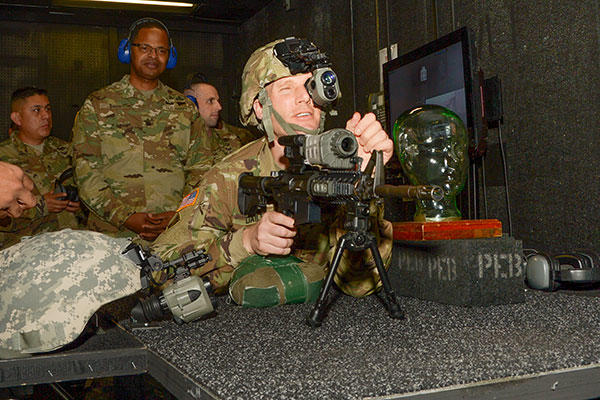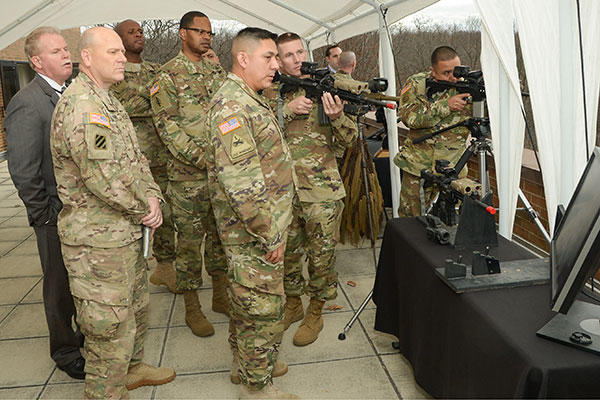FORT BELVOIR, Va. — Bringing together the operational expertise of Army noncommissioned officers and the scientific expertise of civilian engineers is key for better capabilities to get to the field faster, said Sgt. Maj. of the Army Daniel A. Dailey during a visit to Fort Belvoir, Virginia, Dec. 14.
"Of course, we cannot do this without our great civilians and the intellectual capital they bring to the United States Army. They are literally the support network behind what Soldiers do every single day. But bringing the noncommissioned officers here gives them the perspective down to the Soldier-level," Dailey said. "Even the simplest little things like ergonomics or how things work in the battlefield, to very complex things, like if you do this then this will happen, or it's going to be hit or could break, or it's got to be interoperable."
Dailey was joined by the U.S. Army Materiel Command's Command Sgt. Maj. James K. Sims and the U.S. Army Research, Development and Engineering Command's Command Sgt. Maj. James P. Snyder during a visit to the U.S. Army Communications-Electronics Research, Development and Engineering Center, or CERDEC.
CERDEC is the Department of Defense lead for the development of command, control, communications, computers, intelligence, surveillance and reconnaissance, or C4ISR, technologies.
CERDEC Night Vision and Electronic Sensors Directorate, or NVESD, NCOs demonstrated the technology they are developing with scientists and engineers in the areas of ground combat sensors, Soldier sensor systems, and degraded visual environment-mitigation.
Dailey commented on the benefits the technologies will provide to the Soldier while trying sensor technologies. He provided feedback from his operational insight as a former Infantryman.
He tested a rapid target acquisition prototype by firing at targets inside the indoor firing tunnel, which simulates a moonless night sky. The prototype aims to help Soldiers identify secondary targets quickly.
"Infantry squads are going to love that. That is going to revolutionize it [the capability]," Dailey said.
Dailey focused on striving for cost-effective solutions and making sure technologies fit Soldiers' needs.
"It gives that user-ability, test perspective and it allows them to interact so instead of getting that product from design back out to the field and back to design and back to the field, it cuts all that down because we've got the noncommissioned officer here who's got that experience to share with engineers who have that intellectual capital," he said.
Sims said he hoped the visit demonstrated the command's ability to bring together NCOs and engineers and scientists to "have a solution that gets it right the first time."
"It's about the Soldier and the Warfighter," Sims said. "I think the most important thing was to illustrate to the Sergeant Major of the Army that across AMC we have great noncommissioned officers.
"We only have a small percentage of them, but it's important for those noncommissioned officers to bring the relevancy of what we do from a Soldier, NCO perspective and connect that to the engineer and the engineering solution."
Snyder said RDECOM's subject matter experts ensure decisive overmatch for Soldiers.
"We work hard as the research and engineering arm for the Army in getting Soldier input. Having that Soldier perspective on the way we fight helps us get the most benefit from our technologies, to keep our Soldiers safer while making them more effective," Snyder said.





























